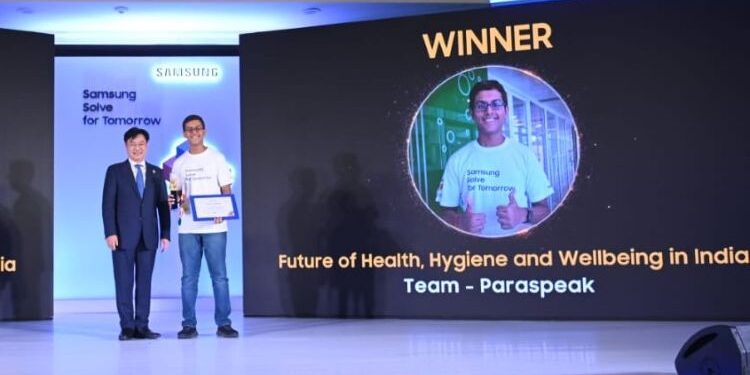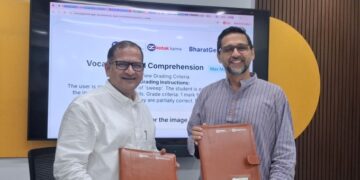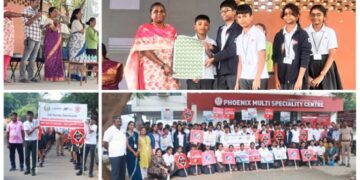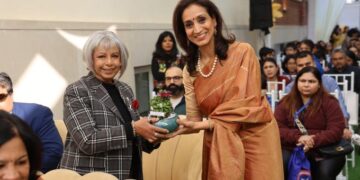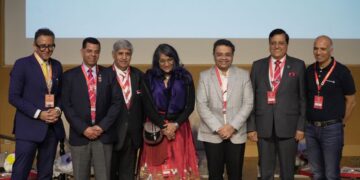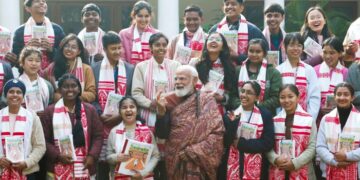Sixteen-year-old Pranet Khetan, a class XI student of Shiv Nadar School, Gurgaon, has been announced as the National Winner of Samsung Solve for Tomorrow 2025 for his groundbreaking project ‘Paraspeak’, an automatic speech recognition (ASR) system which records the impaired or atypical speech of stroke survivors, patients with paralysis, Parkinson’s, cerebral palsy, and other neurological disorders and converts it into clear and intelligible speech in real-time. This project has also earned international acclaim at the Regeneron International Science and Engineering Fair (ISEF) 2025 in Ohio, USA.
Pranet will be receiving ₹25 lakhs in seed funding from Samsung India and an incubation at the Foundation for Innovation and Technology Transfer (FITT), IIT Delhi for this technological innovation.
This pocket-sized device uses deep learning, transfer learning, and India’s first custom-built dataset of Hindi dysarthric speech to train a speech-to-text model that converts garbled speech into coherent output. The converted speech is then played out clearly for others to understand. This innovation is the first to focus on languages with limited impaired speech datasets, like Hindi, making it inclusive, scalable and accessible. By leveraging artificial intelligence and deep learning, Pranet has developed a low-cost device that works in native languages and can be produced for under Rs 2,000.
Speaking about this achievement, Pranet said: “Winning this award is a huge encouragement for me to continue developing technology that has a real social impact. ‘Paraspeak’ began as an idea to give voice to those who struggle to be understood, and this recognition, along with the funding and incubation, will help me scale it further and reach more people. I’m grateful to my mentors, my school and my parents for their constant support in turning curiosity into creation.”.
Pranet spent over one-and-a-half years building ‘Paraspeak’ from scratch, combining his interests in artificial intelligence and assistive technology. The idea was sparked during a visit to a paralysis care centre, where he observed that dysarthria, a condition causing slurred speech due to muscle control issues, was a common symptom across a range of neurological disorders. Motivated to address this unmet need, he focused his research on building an accessible, affordable speech recognition system for underserved languages and communities.
Sameer Arora, Principal, Shiv Nadar School Gurgaon said, “Pranet’s recognition at Samsung Solve for Tomorrow 2025 is a proud moment for all of us. His journey with ‘Paraspeak’ beautifully demonstrates how empathy can inspire meaningful innovation. This achievement not only celebrates his brilliance and perseverance but also reflects the values we nurture at Shiv Nadar School, empowering students to create solutions that bridge technology and humanity and make a tangible difference in the world.”
Unlike commercial voice assistants such as Siri, Alexa, or Google Assistant, which fail to recognise impaired speech, this ASR model is built specifically to process and understand impaired speech patterns. The model achieved over 90% accuracy during testing, despite the absence of any publicly available Hindi dysarthric speech datasets. The device has already been tested with actual patients, including one with a congenital muscular disorder who responded with “constant thumbs-ups and smiles” when he realised he was finally understood.
This system holds promise for a range of real-world applications, enabling users to participate in conversations, send messages, and control smart devices. Supported by his mentor Mr. Nitesh Kumar, Principal Mr. Sameer Arora, and his parents, Pranet plans to expand the scope of this work, with the hope of positively impacting countless lives. He is also currently expanding the scope of his innovative system to cover other voice and speech disorders: to learn more, one can visit his website, www.paraspeak.in.


